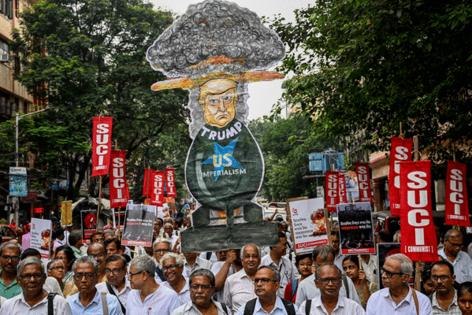John M. Crisp: Doomsday is in the news again
Published in Op Eds
“Doomsday” was in the news last week. It’s an Old English word, dating to the 900s, at least. Doomsday originally denoted Judgment Day, the decisive event at the end of the world when the Almighty separates the sheep from the goats and commends them to their respective fates.
Modern usage expands the word’s scope; we use it to describe any world-ending, cataclysmic disaster. A nuclear war, for example.
I thought of Doomsday recently while watching the Netflix film “A House of Dynamite.” Somebody—it’s not clear who, but suspicions are directed at North Korea—launches an intercontinental ballistic missile toward Chicago. The president of the United States has 18 minutes to figure out how to respond.
The film conjures an era—the late 50s and early 60s—when nuclear Armageddon was more present in people’s minds. Schools held civil defense drills and offered lessons in nuclear decontamination. Some people even built home bomb shelters.
The spirit of the era was captured by Stanley Kubrick’s 1964 film “Dr. Strangelove,” a droll, ironic—and very funny—take on nuclear cataclysm, a film that anyone who saw “A House of Dynamite” should watch, as well.
The complication in “Dr. Strangelove” is that the Russians have developed a Doomsday Machine, a nuclear device designed to automatically detonate upon the outbreak of a nuclear war, destroying the world and providing all sides with a motivation to avoid striking first.
We sort of forgot about Doomsday, however, as the years went by without a nuclear war. Except that last week President Donald Trump announced on social media that—after a 30-year hiatus—he plans “to start testing our Nuclear Weapons on an equal basis.” It’s not clear what he means, but it’s a potent reminder that nuclear Doomsday never really went away.
Neither has environmental Doomsday in the shape of climate change; in fact, environmental Doomsday is increasingly imminent.
Or is it? Last week Doomsday surfaced in a lengthy memo from Bill Gates entitled “Three tough truths about climate.” To the surprise of many, Gates—who as recently as 2021 wrote a book about “climate disaster”—says that the “doomsday view of climate change… is wrong.” He concedes that “climate change will have serious consequences,” but “it will not lead to humanity’s demise.”
And paying too much attention to the “doomsday outlook” diverts resources from “the things we should be doing to improve life in a warming world.”
Gates’s memo is a gift to climate skeptics. The Wall Street Journal pounced immediately, calling the memo an epiphany and smugly announcing the destruction of the “climate conformity caucus.” In short, the Journal implies, we were right all along, and we’re delighted that Gates has come around.
Space doesn’t permit a thorough analysis of Gates’s memo, but allow me to suggest that he dismisses climate Doomsday too casually. Rising temperatures may not, as Gates argues, mean “the end of civilization,” but that’s an awfully low bar. Even Dr. Strangelove muses about the chance to “preserve a nucleus of human specimen” in the bottom of a mineshaft in a post-nuclear-war world.
Sure. But is “Waterworld” any place you would want to live?
Gates concedes that climate change is an “important problem” that needs to be solved, just like malaria and malnutrition. But this is a naive way of thinking about Doomsday. Civilization has always struggled with and survived disease and food scarcity and a multitude of other problems. But our failure to understand that nuclear and climate Doomsday are in an entirely different category is a colossal failure of imagination.
Of course, Doomsday has been predicted before, and it’s never happened. When the Black Death killed about a third of the population of Europe in the 14th Century, many thought the world was coming to an end. It didn’t.
But things are different now. We really do possess weapons with the power to destroy civilization as we know it, and the overburdened Earth really does have limits to its carrying capacity for humanity.
In short, we’ve made Doomsday possible. And the fact that it hasn’t happened yet doesn’t mean that it won’t.
_____
_____
©2025 Tribune Content Agency, LLC
























































Comments